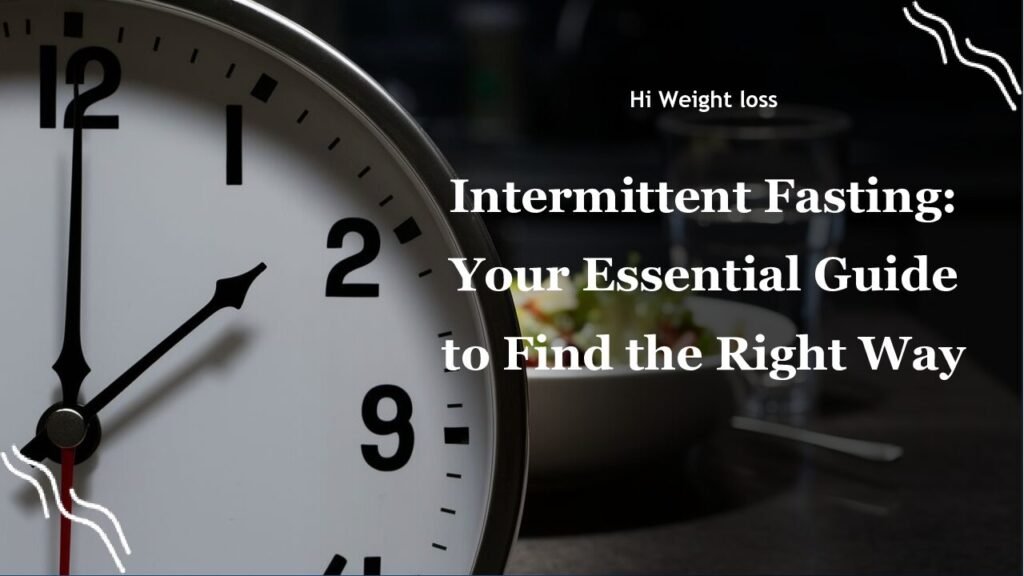Feeling the pull of intermittent fasting (IF) but worried about the potential downsides? You’re not alone. Many people jump into IF hoping for weight loss or other health benefits, only to be surprised by the range of side effects that can crop up. This article dives deep into what you might experience while practicing intermittent fasting, covering everything from common complaints to more serious issues, offering insights to help you make an informed decision, and giving you the knowledge to do it safely.
What Are the Side Effects of Intermittent Fasting?
Common Side Effects of Intermittent Fasting
Let’s start with the most common side effects of intermittent fasting you might encounter. These are often the first signs your body is adjusting to a new eating pattern, and while generally mild, they can be bothersome.
Excessive Hunger Pangs
One of the biggest hurdles? Intense hunger pangs. During fasting periods, your stomach might feel like it’s staging a protest. It’s completely normal, but challenging to manage. I remember a friend telling me about how she had to carry around a water bottle everywhere she went to distract herself when she started IF, those were really hard times she said.
Fatigue and Low Energy
Feeling like you’re running on empty? Fatigue and low energy are common when your body switches to using stored fat for fuel. This adjustment period can leave you feeling sluggish, at least initially.
Headaches
Many people experience headaches when starting IF. These can range from mild to quite severe, likely due to the physiological changes happening in your body as it adapts. I often get headaches when I’m dehydrated or haven’t eaten for a while, it makes sense that some people would get headaches when starting this diet.
Dizziness
Feeling lightheaded? Dizziness can occur, and this is often linked to changes in blood sugar levels or dehydration during your fasting window.
Digestive Issues
Your digestive system might also feel a little off. Digestive issues like constipation or bloating can occur, particularly if you’re not eating a well-balanced diet during your eating windows.
Irritability and Mood Changes
The restrictive nature of IF can sometimes lead to irritability and mood changes. It can be tough to deal with hunger, and that can understandably impact your mood, which I’ve definitely experienced before.
Bad Breath
This is an unexpected one, but bad breath is a common side effect, often resulting from metabolic changes during fasting.
Sleep Disturbances
Can’t sleep well? Sleep disturbances are another common side effect. Your body is adjusting to a new eating schedule, which can disrupt your sleep pattern.
Dehydration
It’s crucial to drink enough water. Inadequate fluid intake during your fasting hours can lead to dehydration, which can then worsen other side effects.
Polyuria (Excessive Urination)
You might notice you’re making more trips to the bathroom. Polyuria, or excessive urination, can happen, especially if your hydration isn’t balanced. This is another potential negative effect of intermittent fasting.
Potential Impacts on Reproductive Health
For women, IF can have unique impacts, particularly on reproductive health.
Menstrual Cycle Changes
Some women experience changes in their menstrual cycle, including _amenorrhea_ (absence of menstruation), due to sudden weight loss or inadequate calorie intake. This is a serious side effect that needs to be addressed with a doctor. This isn’t the first time that I have heard about women who experience these problems when on a low calorie diet.
Nutrient Deficiencies and Malnutrition
One of the more dangerous negative effects of intermittent fasting is the risk of nutrient deficiencies. If your diet is not well-balanced, you may not be getting all the essential nutrients you need. This can lead to serious health problems, including malnutrition, it’s really important to plan meals appropriately.

More Severe Potential Side Effects
While most side effects of intermittent fasting are manageable, some can be quite serious. It’s important to be aware of these to ensure your safety.
Hypoglycemia (Low Blood Sugar)
For people with diabetes, hypoglycemia, or low blood sugar, is a serious risk. Untreated, this can lead to seizures and brain damage. I once had a family member who had a hypoglycemic episode when not eating regularly and it was terrifying for the whole family. It needs to be avoided at all costs.
Malnutrition
As mentioned above, if you’re not careful, you can end up with serious malnutrition. This can have long-term health consequences and should be a serious concern. It’s not worth damaging your health just for a weight loss diet.
Who Should Be Cautious About Intermittent Fasting?
Intermittent fasting isn’t for everyone. People with pre-existing health conditions or those at risk of developing eating disorders should approach it with extreme caution.
Here’s a summary of the potential side effects of intermittent fasting in an easy to digest table:
| Side Effect | Description |
|---|---|
| Excessive Hunger | Intense hunger pangs during fasting periods. |
| Fatigue | Low energy due to body adapting to use of stored fat. |
| Headaches | Mild to severe headaches due to physiological changes. |
| Dizziness | Lightheadedness from blood sugar or dehydration. |
| Digestive Issues | Constipation, bloating, and other digestive problems. |
| Irritability | Mood swings due to restriction. |
| Bad Breath | Resulting from metabolic changes during fasting. |
| Sleep Disturbances | Disrupted sleep patterns. |
| Dehydration | Resulting from inadequate fluid intake. |
| Polyuria | Excessive urination due to imbalances. |
| Menstrual Changes | Cycle changes, including amenorrhea. |
| Nutrient Deficiencies | Inadequate nutrients from unbalanced diets. |
| Hypoglycemia | Low blood sugar, especially risky for diabetics. |
| Malnutrition | Severe health problems due to inadequate nutrient intake. |
Conclusion
Intermittent fasting, while popular for its potential health benefits, does come with a variety of side effects. From common issues like hunger pangs, fatigue, and headaches, to more severe problems such as hypoglycemia and malnutrition, it’s crucial to understand what you might encounter. The experience of intermittent fasting varies from person to person, my friend’s experience of having to carry a water bottle with her everywhere serves as a clear example of some of the difficulties you may face. Many of these side effects are temporary as your body adjusts, but not all are harmless, you really need to consult your doctor before starting any new diet.
Remember that intermittent fasting may be particularly dangerous for people with specific health conditions or those at risk of developing eating disorders, such as those with pre-existing health conditions, or that are at risk of developing eating disorders. Always seek professional advice before starting any new diet. If you have found this article helpful please share it with your friends, it may help them make an informed decision about whether to try intermittent fasting or not.
FAQ
Are the side effects of intermittent fasting permanent?
Most common side effects are temporary and subside as your body adapts. However, severe side effects like malnutrition may require medical attention and can have lasting consequences. It is always advised to contact a professional before starting the diet. You can learn more about the dangers of intermittent fasting.
How can I manage hunger during intermittent fasting?
Stay well hydrated and ensure you eat nutrient-rich foods during your eating windows. Some strategies, such as drinking water and consuming high-fiber food, can help manage hunger. The source women’s health mag provides more information on this.
Is intermittent fasting safe for everyone?
No, it isn’t. Intermittent fasting may not be suitable for people with certain pre-existing health conditions, pregnant women, or individuals with a history of eating disorders. The Mayo Clinic has further information. It’s crucial to consult a healthcare provider before starting IF.
Can intermittent fasting affect my sleep?
Yes, it can. The body’s adjustment to the new eating schedule can cause sleep disturbances in some people. If you find you are experiencing this mayo clinic health can provide further advice.



